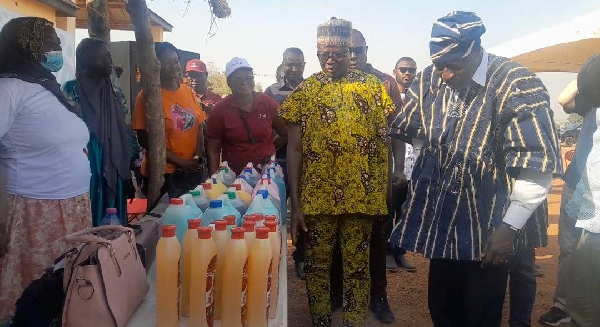Our Terms & Conditions | Our Privacy Policy
It’s a game changer – World Bank Veep hails impactful SOCO projects
The Vice-President of the World Bank for West and Central Africa, Ousmane Diagana, has hailed the transformative impact of the Gulf of Guinea Northern Regions Social Cohesion Project (SOCO) on the lives of people, particularly those in poor rural communities in northern Ghana.
“SOCO,” he noted, “is a game-changer,” assuring expedited action for the release of funds to continue the project and expand its reach to more beneficiary communities.
Diagana made this observation on Saturday, January 11, 2025, when he led a delegation comprising the World Bank Ghana Country Director, Robert Taliercio O’Brien; the Director for Local Governance and Decentralization, Samuel Seth Passah; and representatives from USAID, UNDP, and UNHCR to inspect several SOCO projects in the Northern Region.
The World Bank is funding the $450 million SOCO project, which is being implemented in four countries: Ghana, Togo, Benin, and Côte d’Ivoire.
Diagana, a practical and hands-on leader, became more convinced of the project’s impact after inspecting the Nangbag-Yapala Livestock Market in the Sagnarigu Municipal Assembly. The market has opened up the local economy and boosted economic activities for small-scale business operators.
The Livestock Market, equipped with a modern kraal facility, a holding bay, a loading ramp, toilets, and offices for a veterinary officer, a revenue collector, and a chief butcher, serves as an economic hub. It fosters vibrant commerce and creates livelihood opportunities for the community.
Farmers selling cattle at the market, which commenced operations on November 3, 2024, earn an income of about GH¢400,000 each market day (Sunday), according to data from the Ministry of Local Government, Decentralization, and Rural Development. Income from the sale of small ruminants on market days is estimated at about GH¢100,000.
During the site visit, Diagana also inspected other livelihood initiatives, including the Daboya Smock Weavers Association and the Shishagu Soap Makers’ Group. The latter, comprising 13 women and two men, has become a symbol of hope for the community.
According to SOCO project implementers, investments in these groups have fostered social cohesion by uniting people within the community.
“I am very satisfied. I have seen concrete activities funded by the project. I am very impressed to see that there is a community at large benefiting from the project – that is the essence of the initiative. They consider it their project, creating a sense of community ownership, which is critical,” Diagana observed.
He added, “I also understand that these needs were expressed by the community themselves. This shows that we have been responsive to their needs, which is what such projects aim to achieve.
“Of course, given the magnitude of the need, it is crucial to make good use of what already exists and to communicate effectively about the project’s activities so that partners are encouraged to contribute more.”
Given the positive impact stories shared by beneficiary communities, there is growing demand to extend the project to non-beneficiary areas. This places significant responsibility on the project’s funding sponsors and partners.
In response, Diagana said the increasing requests to extend the project reflect its success. He assured that the World Bank would continue to support SOCO to achieve its objectives and expressed optimism that governments in the four beneficiary countries—Ghana, Togo, Benin, and Côte d’Ivoire—would play their part in ensuring the project’s sustainability.
World Bank Ghana Country Director Robert Taliercio O’Brien emphasized that feedback from beneficiary Metropolitan, Municipal, and District Assemblies (MMDAs) is valuable for refining the project structure to achieve desired results.
Samuel Seth Passah, the Director for Local Governance and Decentralization, speaking on behalf of the Chief Director at an engagement with project stakeholders, highlighted the significant progress made.
“Within two years of the project’s effectiveness, we have begun to see its impact on the ground across 48 districts, 217 clusters, and 1,700 communities, representing a population of 1.5 million. The project has disbursed $60 million (40%) of the total $150 million within this period,” he noted.
The SOCO project coordinator, Elizabeth Ohenewah Agyei, acknowledged challenges in encouraging minority groups to participate but noted that continuous engagement with these groups is yielding positive results, further ensuring the project’s sustainability.
She emphasized that the project’s development goals had been achieved within two years of implementation.
“Going forward, we need to address the needs of those aspiring to be beneficiaries. Additionally, it’s crucial to measure the changes occurring due to the project. Without precise measurement, we cannot determine where improvements are needed or plan the next steps effectively,” she explained.
KA
Watch the latest edition of BizTech below:
Click here to follow the GhanaWeb Business WhatsApp channel
Images are for reference only.Images and contents gathered automatic from google or 3rd party sources.All rights on the images and contents are with their legal original owners.



Comments are closed.